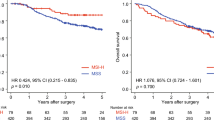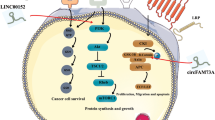Abstract
Gastric cancer (GC) is a multistep process characterized by a gradual accumulation of genetic and epigenetic alterations in genes at various stages of progression. Epigenetic alterations like DNA methylation play an important role in cancer and may serve as a biomarker for cancer. The present study was aimed to investigate the promoter hypermethylation, expression profile, and Arg399Gln gene polymorphism of DNA repair gene XRCC1 (X-ray repair cross complimentary group I) in GC patients. A total of 60 histopathologically confirmed GC subjects were recruited in the study. Information on various dietary, lifestyle and environmental factors was obtained in face-to-face interviews using a structured questionnaire from each subject. Tissue samples were taken along with adjacent non-cancerous tissues for analysis. Promoter methylation status and expression of XRCC1 gene was evaluated using MS-PCR and western blotting respectively; while as Arg399Gln polymorphism was analyzed by PCR-RFLP. We found that the XRCC1 gene promoter of 38.3% cancerous tissues were methylated compared to 13.3% of adjacent normal tissues. The promoter hypermethylation status of the gene was found to be significantly associated with the loss of protein expression (P < 0.0001, OR = 14.63; 95% CI 4.01–53.43). However, we did not find any significant association of polymorphism of XRCC1 Arg399Gln with promoter methylation or protein expression. Further, comparison of methylation status and protein expression with clinical parameters like age, smoking status, etc. was also not significant (P > 0.05). The present study indicates that XRCC1 undergoes aberrant promoter hypermethylation with subsequent loss of protein expression in gastric cancer.


Similar content being viewed by others
Abbreviations
- GC:
-
Gastric cancer
- DNA:
-
Deoxyribonucleic acid
- BER:
-
Base excision repair
- PARP:
-
Poly ADP ribose polymerase
- SNP:
-
Single nucleotide polymorphism
- XRCC1:
-
X-ray repair cross complementary 1
- PCR:
-
Polymerase chain reaction
- EDTA:
-
Ethylenediaminetetraacetic acid
- MS-PCR:
-
Methylation specific polymerase chain reaction
- RFLP:
-
Restriction fragment length polymorphism
- CpG:
-
Cytosine-phosphate-guanine
References
Bray F, Ferlay J, Soerjomataram I, Siegel RL, Torre LA, Jemal A (2018) Global cancer statistics 2018: GLOBOCAN estimates of incidence and Mortality worldwide for 36 cancers in 185 countries. CA: A Cancer J Clin 68:394–424
Ferlay J, Ervik M, Lam F (2018) Global Cancer Observatory: Cancer Today. International Agency for Research on Cancer, Lyon, France
Ferlay J, Soerjomataram I, Ervik M, Dikshit R, Eser S, Mathers C, Rebelo M, Parkin DM, Forman D, Bray F (2013) GLOBOCAN 2012 v1.0, Cancer Incidence and Mortality Worldwide: IARC Cancer Base No. 11. International Agency for Research on Cancer, Lyon, France.
Allemani C, Weir HK, Carreira H, Harewood R, Spika D, Wang XS (2015) Global surveillance of cancer survival 1995–2009: analysis of individual data for 25,676,887 patients from 279 population-based registries in 67 countries (CONCORD-2). Lancet 385:977–1010
Qurieshi MA, Khan SM, Masoodi MA, Qurieshi U, Ain Q, Jan Y, Haq I, Ahmad SZ (2016) Epidemiology of cancers in Kashmir, India: an analysis of hospital data. Adv Prev Med 1896761:1–6
Padmanabhan N, Ushijima T, Tan P (2017) How to stomach an epigenetic insult: the gastric cancer epigenome. Nat Rev Gastroenterol Hepatol 14(8):467–478
Tahara T, Arisawa T (2015) DNA methylation as a molecular biomarker in gastric cancer. Epigenomics 7(3):475–486
Costello JF, Plass C (2001) Methylation matters. J Med Genet 38:285–303
Du-Guan F (2015) Epigenetic alterations in gastric cancer. Mol Med Rep 12:3223–3230
Schubeler C (2015) Function and information content of DNA methylation. Nature 517:321–326
Christmann M, Tomicic MT, Roos WP, Kaina B (2003) Mechanisms of human DNA repair: an update. Toxicology 193:3–34
Iyama T, Wilson M (2013) DNA repair mechanisms in dividing and non-dividing cells. DNA Repair (Amst). 12:620–636
Nouspikel T (2009) DNA repair in mammalian cells: nucleotide excision repair: variations on versatility. Cell Mol Life Sci 66:994–1009
London R (2015) The structural basis of XRCC1-mediated DNA repair. DNA Repair 30:90–103
Wallace S (2014) Base excision repair: a critical player in many games. DNA Repair 19:14–26
Norjmaa B, Tulgaa K, Saitoh T (2016) Base excision repair pathway and polymorphisms of XRCC1 gene. J Mol Pathol Epidemiol 1:1–6
Yi L, Xiao-H Yun L, Ye S (2013) Association between the XRCC1 Arg399Gln polymorphism and risk of cancer: evidence from 297 case-control studies. Plos One 8:e78071
Li WQ, Zhang L, Ma JL, Zhang Y, Li JY, Pan KF, You WC (2009) Association between genetic polymorphisms of DNA base excision repair genes and evolution of precancerous gastric lesions in a Chinese population. Carcinogenesis 30:500–505
Goekkurt E, Al-Batran SE, Hartmann JT, Mogck U, Schuch G, Kramer M, Jaeger E, Bokemeyer C, Ehninger G, Stoehlmacher J (2009) Pharmacogenetic analyses of a phase III trial in metastatic gastroesophageal adenocarcinoma with fluorouracil and leucovorin plus either oxaliplatin or cisplatin: a study of the arbeitsgemeinschaft internistische onkologie. J Clin Oncol 27:2863–2873
Wang P, Tang T, Peng S, Chen Y, Zhang J, Fang Y (2010) XRCC1 downregulated through promoter hypermethylation is involved in human gastric carcinogenesis. J Dig Dis 11:343–351
Xia Y, Ding B, Liu Q, Chen X, Cheng S, Li L (2014) Racial/ethnic disparities in human DNA methylation. Biochim. Biophys. Acta 1846(1):258–262
Sambrook J, Russel D (2001) Molecular Cloning: A Laboratory Manual, 3rd edn. Cold Spring Harbor Laboratory Press, New York
Herman G, Graff R, Myohanen S, Nelkin D, Baylin B (1996) Methylation-specific PCR: a novel PCR assay for methylation status of CpG islands. Proc Natl Acad Sci USA 93:9821–9826
Slyskova J, Korenkova V, Collins AR, Prochazka P, Vodickova L, Svec J, Lipska L, Levy M, Schneiderova M, Liska V (2012) Functional, genetic, and epigenetic aspects of base and nucleotide excision repair in colorectal carcinomas. Clin Cancer Res: An Off J Am Assoc Cancer Res 18:5878–5887
Bradford MM (1976) A rapid and sensitive method for the quantitation of microgram quantities of protein utilizing the principle of protein-dye binding. Anal Biochem 72:248–254
Ushijima T, Asada K (2010) Aberrant DNA methylation in contrast with mutations. Cancer Sci 101:300–305
Calcagno DQ, Gigek CO, Chen ES, Burbano RR, Smith Mde A (2013) DNA and histone methylation in gastric carcinogenesis. W J Gastroenterol 19:1182–1192
Tsai KW, Wu CW, Hu LY, Li SC, Liao YL, Lai CH, Kao HW, Fang WL, Huang KH, Chan WC (2011) Epigenetic regulation of miR-34b and miR-129 expression in gastric cancer. Int J Cancer 129(11):2600–2610
Tsai HC, Baylin SB (2011) Cancer epigenetics: linking basic biology to clinical medicine. Cell Res 21:502–517
Esteller M (2007) Epigenetics provides a new generation of oncogenes and tumor-suppressor genes. Br J Cancer 96:R26-30
Sapari NS, Loh M, Vaithilingam A, Soong R (2012) Clinical potential of DNA methylation in gastric cancer: a meta-analysis. PloS One 7:e36275
Wang K, Yuen ST, Xu J, Lee SP, Yan HH, Shi ST, Siu HC, Deng S, Chu KM, Law S (2014) Whole-genome sequencing and comprehensive molecular profiling identify new driver mutations in gastric cancer. Nat Genet 46:573–582
Xue H, Ni P, Lin B, Xu H, Huang G (2011) X-ray repair cross-complementing group 1 (XRCC1) genetic polymorphisms and gastric cancer risk: A HuGE review and meta-analysis. Am J Epidemiol 173:363–375
Ladiges WC (2006) Mouse models of XRCC1 DNA repair polymorphisms and cancer. Oncogene 25:1612–1619
Yuan T, Deng S, Chen M, Chen W, Lu W, Huang H, Xia J (2011) Association of DNA repair gene XRCC1 and XPD polymorphisms with genetic susceptibility to gastric cancer in a Chinese population. Cancer Epidemiol 35:170–174
Jain A, Bhoyar R, Pandhare K et al (2020) IndiGenomes: a comprehensive resource of genetic variants from over 1000 Indian genomes. Nucleic Acids Res gkaa:923.
Acknowledgements
The authors acknowledge the financial support provided by the Council of Scientific and Industrial Research (CSIR), Pusa, New Delhi under the Reference Number: 09/251(0049)/2012-EMR-I. The authors are extremely thankful to all the subjects who took part in this study. We are also grateful to all the consultants and paramedical staff at SKIMS, Srinagar, for their valued help during subject recruitment and sample collection. The authors are also thankful to Dr. Iqra Hamid and Ms. Sumaiya Nabi, Department of Biochemistry, University of Kashmir for their help and research assistance during this work.
Author information
Authors and Affiliations
Corresponding author
Ethics declarations
Conflicts of interest
The authors report no conflicts of interest.
Ethical approval
All the patients duly signed the informed consent and the recruitment of patients was initiated following the approval from the institutional ethics committee of Sher-i-Kashmir Institute of Medical Sciences (SKIMS), Srinagar, India vide reference number: SIMS 1 31/IEC-SKIMS/2014-01-03.
Additional information
Publisher's Note
Springer Nature remains neutral with regard to jurisdictional claims in published maps and institutional affiliations.
Supplementary Information
Below is the link to the electronic supplementary material.
Rights and permissions
About this article
Cite this article
Nissar, B., Kadla, S.A., Wani, K.A. et al. Promoter CpG island hypermethylation and down regulation of XRCC1 gene can augment in the gastric carcinogenesis events. Mol Biol Rep 48, 405–412 (2021). https://doi.org/10.1007/s11033-020-06064-4
Received:
Accepted:
Published:
Issue Date:
DOI: https://doi.org/10.1007/s11033-020-06064-4




